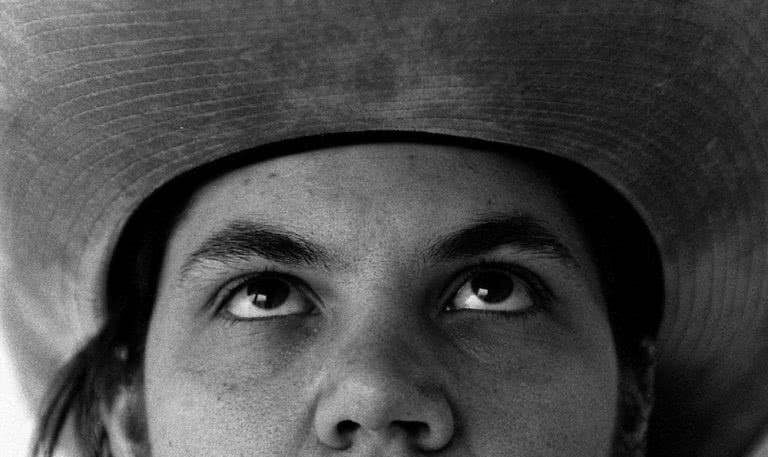Given that Jeff Tweedy is the frontman of Wilco, a band that’s shape-shifted at will across the past quarter century, it’s only natural that his memoir doesn’t hold the format especially sacred. He may loosely follow the progress of his creative pursuits, but the prevailing theme is humour. In fact, music often takes a back seat to wisecracks that prove therapeutic for reader and writer alike.
Named for an catchphrase coined by his father, Let’s Go (So We Can Get Back) sees Tweedy dwell as much on his personal life and family history as on Wilco and Uncle Tupelo. He does seize the opportunity for some myth-busting and sharing of his side of various disputes, but his overall irreverence makes this read more like Parker Posey’s recent anti-memoir You’re on an Airplane than like your typical music tome.
But seeing as Wilco’s two latest albums were named Star Wars and Schmilco, Tweedy isn’t one to take himself too seriously.
Growing up in Belleville, Illinois, a depressed railroad town half an hour from St Louis and more than four hours from his eventual base of Chicago, Tweedy was a rabid consumer of music from a young age. He inherited his much older brother’s record collection and fell in love with punk, especially The Clash and the Minutemen. At age 14, he enraged his father by honouring a request to play the album he’d just received for Christmas: PiL’s Flowers of Romance.
A rare schoolmate who also adored punk was Jay Farrar, with whom Tweedy started playing in a teen cover band that evolved into alt-country pioneers Uncle Tupelo. Tweedy doesn’t give much time to that tag, though, dubbing the band “a punk-country hybrid that a smattering of critics and punk-country-hybrid loyalists [would] blow way out of proportion.”
He does allude to such pigeonholing later, in regards to Wilco: “I really didn’t want people to think of us with a label attached – roots music or Americana or whatever brand they were peddling that week.”
Wilco favourite ‘Jesus, etc.’
Love Music?
Get your daily dose of metal, rock, indie, pop, and everything else in between.
Uncle Tupelo released four albums by the time the pair were in their mid-20s. The title of their 1990 debut, No Depression, was adopted as the name of both an alt-country movement and its flagship magazine, while their third album was produced by R.E.M.’s Peter Buck and their fourth earned release on a major album.
Farrar pulled the plug in 1994, freeing up space for Wilco and his own subsequent band, Son Volt. Tweedy still nurses some hurt feelings there, but admits that he didn’t do much better when dismissing certain Wilco members.
That kind of frankness keeps Tweedy sympathetic, even at his less fine moments. And the book has plenty of those, such as when he stole his mother-in-law’s cancer medication while addicted to painkillers. But his openness seems key to his personality, and he’s remarkably honest about his struggles with rehab and therapy. His self-deprecating streak goes a long way toward endearing him to us.
As with any memoir that spans a significant amount of time, there’s a theme of survival here. Tweedy mourns the loss of his older brother to alcoholism, and of former Wilco multi-instrumentalist Jay Bennett to drug addiction. He details his wife’s successful battles with cancer and reminds himself how lucky he is to have stopped drinking at age 23 and kicked opioids further down the track.
Family is vital to Tweedy, and some of the book’s best parts hinge on his close bond to – and cutting banter with – his wife, Sue Miller, who co-owned the iconic Chicago indie venue Lounge Ax, and his two sons, who’ve both become his collaborators. There’s even a cute comic, illustrated by George Eckart, about the shared epiphany after which he and his wife knew that they were each “the one.”
Watch Wilco perform on NPR’s Tiny Desk series
Subtitled A Memoir of Recording and Discording with Wilco, etc., the book does devote considerable time to that band, who debuted near the end of 1994. After writing songs for years to play against Farrar’s songs in Uncle Tupelo, Tweedy was thrilled for Wilco to exploit more open parameters: “Now it seemed more exciting to contemplate how much one band could embrace.”
While Tweedy addresses Wilco’s very public departure from Reprise over 2001’s more challenging Yankee Hotel Foxtrot – and the contentious documentary capturing that turning point – he mostly glosses over their earlier masterpiece, 1996’s Being There.
Other albums aren’t given as much time as, say, his recent work with Mavis Staples. But his unwillingness to devote equal time to each talking point is part of his idiosyncratic approach, whether he’s framing Wilco as an “art collective” or joking that the only way to win another Grammy would be to kill and eat the heart of rival Dave Grohl.
For all that tongue-in-cheek playfulness, the book allows Tweedy to revisit some crucial emotions and memories from his past, which very much informed his new solo album, WARM. In the best example of that push-pull between the funny and the tragic, he explains in the epilogue that the book’s title isn’t just a family in-joke, but an uncomfortable emblem of their shared history of anxiety.
While readers won’t get a complete portrait of Wilco from this book, what they will get is a heartwarming, heartbreaking story that only Tweedy could tell.

































